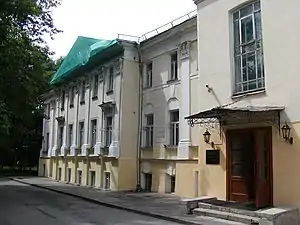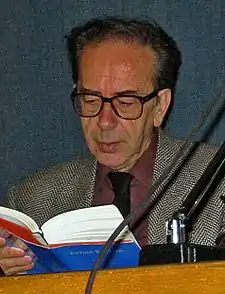Maxim Gorky Literature Institute
The Maxim Gorky Literature Institute (Russian: Литературный институт им. А. М. Горького) is an institution of higher education in Moscow. It is located at 25 Tverskoy Boulevard in central Moscow.[1]

History
The institute was founded in 1933 on the initiative of Maxim Gorky,[2] and received its current name at Gorky's death in 1936.
The institute has been at the same location, not far from Pushkin Square, for more than seventy years, in a complex of historic buildings dating back to the 18th and 19th centuries. The main building at 25 Tverskoy Boulevard was the birthplace of Alexander Herzen and frequented by well-known writers of the 19th century, including Nikolai Gogol, Vissarion Belinsky, Pyotr Chaadayev, Aleksey Khomyakov, and Yevgeny Baratynsky.[3]
In the 1920s it housed various writers' organizations and a literary museum. It also provided accommodations for writers, including Andrei Platonov, Vsevolod Ivanov, Osip Mandelstam, and Boris Pasternak. Mikhail Bulgakov used it as the model for "Griboyedov House" in The Master and Margarita.[3]
Curriculum
The institute's curriculum includes courses in the humanities and social sciences and seminars on a variety of literary genres, including prose, poetry, drama, children's literature, literary criticism, writing for the popular press, and literary translation. It has graduate and doctoral programs and a standing committee for doctoral and candidate dissertation defenses. The institute offers a two-year program of Advanced Literary Courses for highly qualified students, and its Literary Institute oversees an Advanced Literary Translation School, as well as courses in Editing, Copyediting and Foreign Languages. It also has a high school and offers preparatory courses for applicants to the Literary Institute.[3]
Notable alumni
- Chinghiz Aitmatov (novelist)
- Bella Akhmadulina (poet)
- Maria Alyokhina (writer, musician, activist)
- Maria Arbatova (writer, feminist and politician)
- Viktor Astafyev (novelist)
- Vasily Belov (writer)
- Yuri Bondarev (writer)
- Nambaryn Enkhbayar (novelist, President of Mongolia between 2005—2009)
- Alexander Galich (poet, singer-songwriter)
- Rasul Gamzatov (poet)
- Fatmir Gjata (writer, journalist)
- Boris Golovin (poet, singer-songwriter)
- Fazil Iskander (novelist)
- Ismail Kadare (novelist, poet)
- Yuri Kazakov (writer)
- Oleg Khafizov (writer)
- Anatoly Kim (writer)
- Jaroslav Melnik (writer)
- Jabir Novruz (National Poet of Azerbaijan)
- Aramashot Papayan (playwright)
- Oleg Pavlov (writer)
- Viktor Pelevin (novelist)
- Hovhannes Shiraz (poet)
- Viktor Rozov (dramatist, screenwriter — The Cranes Are Flying)
- Yury Trifonov (writer)
- Yevgeny Yevtushenko (poet, singer-songwriter, novelist, essayist, dramatist, screenwriter)
- Nikolay Rubtsov (poet)
- Drago Siliqi (writer, literary critic, and publisher)
- Konstantin Simonov (writer)
- Maithripala Sirisena (President of Sri Lanka)
- Oksana Vasyakina (writer)
- Halima Xudoyberdiyeva (People's Poet of Uzbekistan)
Notes
- "Maxim Gorky Institute of Literature and Creative Writing | University Directory". www.university-directory.eu. Retrieved 15 August 2019.
- "Maxim Gorky Literary Institute: UNESCO Culture Sector". web.archive.org. 28 May 2012.
- "Литературный институт имени А.М. Горького". litinstitut.ru. Retrieved 15 August 2019.
References
- Holquist, Michael. Dialogism: Bakhtin and His World, Second Edition. Routledge, 2002.
- Holquist, Michael. “Introduction.” Speech Genres and Other Late Essays. By Mikhail Bakhtin. Eds. Caryl Emerson and Michael Holquist. Austin: University of Texas Press, 1986. ix-xxiii.
External links
- Official website
 (in Russian)
(in Russian)
.jpg.webp)
